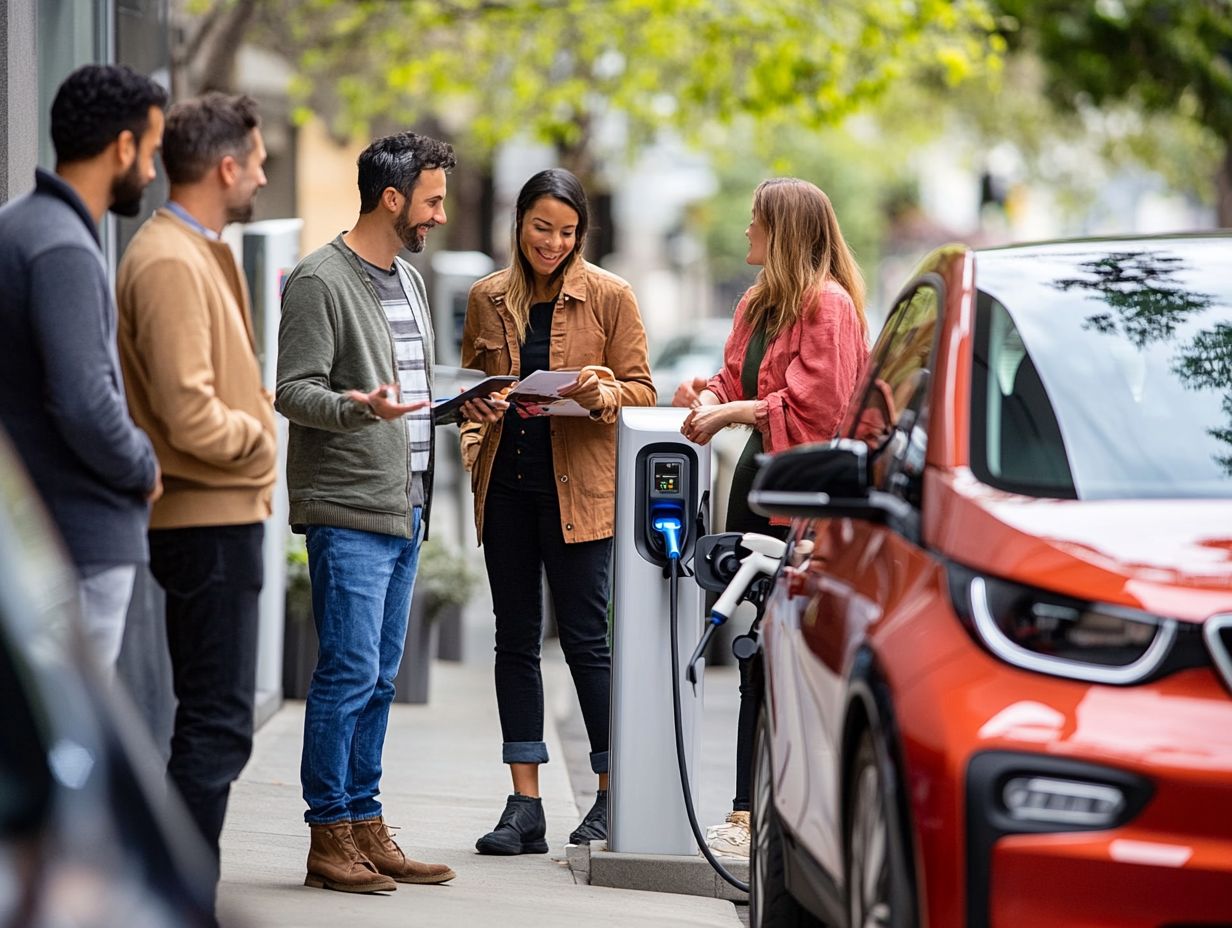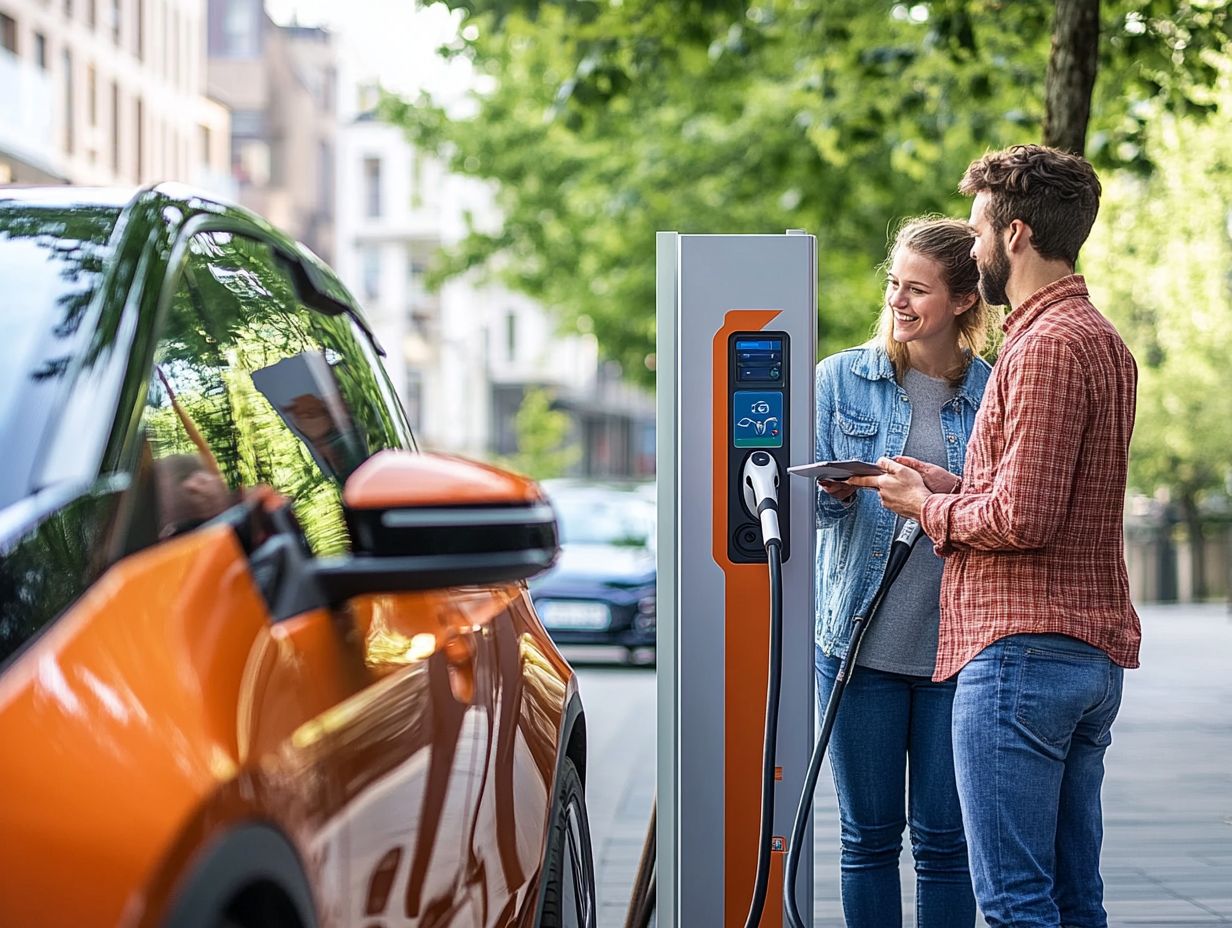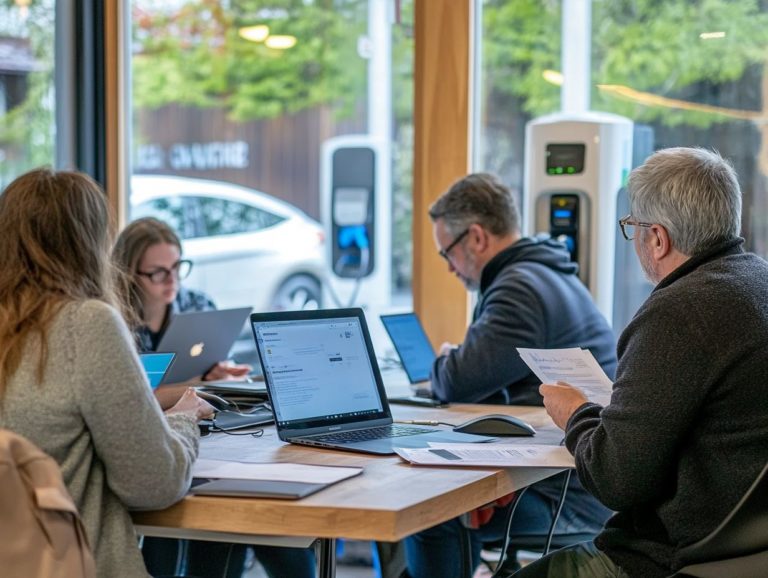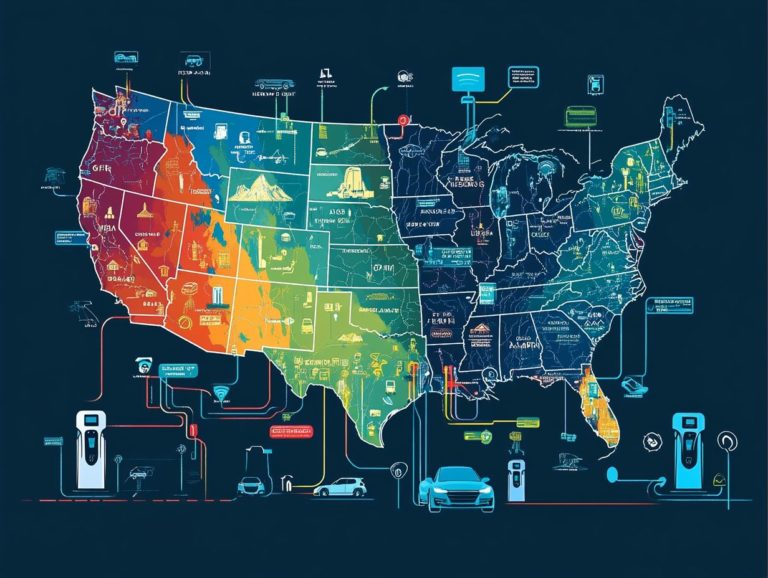incentives for charging station installation
As the demand for electric vehicles (EVs) rises, so does your need for accessible charging infrastructure.
Understanding the various financial help available for charging stations can significantly reduce your installation costs. This support encourages both businesses and homeowners to embrace the transition to electric vehicles.
This article explores the different types of financial help available, from tax credits to grants, while highlighting the benefits of installing charging stations.
We will also outline eligibility criteria and provide practical tips to help you make the most of these opportunities.
Whether you’re an EV owner or a business looking to invest, this information will guide you toward a greener future!
Contents
- Key Takeaways:
- Types of Incentives Available
- Benefits of Installing Charging Stations
- Eligibility and Requirements for Incentives
- How to Maximize Incentives for Charging Station Installation
- Frequently Asked Questions
- What type of incentives are available for charging station installation?
- Are there any federal incentives specifically for installing charging stations?
- Do state governments offer incentives for charging station installation?
- What types of businesses are eligible for charging station installation incentives?
- Can individuals receive incentives for installing a charging station at home?
- Are there deadlines or limitations for applying for charging station installation incentives?
Key Takeaways:

Incentives for charging station installation include tax credits, grants, and benefits from government and private organizations. Installing charging stations can lead to environmental impact, cost savings, and convenience for electric vehicle owners.
Make sure to meet eligibility requirements to maximize these benefits!
What are Charging Station Incentives?
Charging station incentives are programs and financial benefits offered by governments and organizations to encourage the installation of charging stations for electric vehicles (EVs). These include tax credits, rebates, and grants designed to reduce the costs associated with purchasing and installing EV chargers at both residential and commercial properties. To learn more about these opportunities, check out what to know about rebates for charging stations.
Under the Inflation Reduction Act, significant investments are being made to establish a reliable and accessible network of charging stations. This helps promote EV adoption while alleviating the financial burden for businesses and homeowners.
By providing programs like tax credits and rebates, governments enable financing for EV owners and stimulate investments in clean energy infrastructure. This is essential for a sustainable future. The financial benefits from these incentives can save you thousands over time, making the switch to electric vehicles not just an environmentally conscious choice but also a financially savvy one!
Automakers play a crucial role by creating vehicles that can fully utilize these charging infrastructures. As infrastructure improves, the collaboration between EV manufacturers and charging networks strengthens the commitment to reducing carbon emissions, paving the way for a smoother transition to renewable energy solutions.
Types of Incentives Available
A wealth of financial help awaits you if you’re considering installing EV chargers! These programs are crafted to alleviate costs and promote the adoption of electric vehicles.
These financial aids often include tax credits, which help reduce your taxable income, along with rebates that offer direct discounts on charging equipment purchases.
Grants and funding opportunities from various organizations and government entities can also significantly enhance the feasibility of installing charging stations. This makes it easier for you to participate in clean energy initiatives and contribute to a more sustainable future!
Tax Credits and Rebates
Tax credits and rebates are vital financial incentives that can make the installation of EV chargers more affordable for you, whether you’re a consumer or a business owner.
Tax credits allow you to deduct a specific amount from the taxes you owe, while rebates offer direct returns on the purchase of electric vehicle chargers and related equipment.
With the Clean Energy Tax Credit, you might be eligible to claim up to $1,000 for residential installations! This can significantly lower your initial costs and encourage the broader adoption of electric vehicles.
For businesses, the incentives are even more enticing, potentially providing returns of up to $30,000 for commercial installations. This not only boosts your sustainability initiatives but also helps reduce energy expenses.
Eligibility usually requires that the charger be installed at your primary residence or place of business. The application process typically involves submitting the necessary documentation to local or federal agencies.
These financial incentives simplify the transition to clean technologies for homeowners and businesses while aligning with governmental objectives aimed at reducing greenhouse gas emissions. This ultimately contributes to a cleaner environment for generations to come!
Grants and Funding Opportunities
Grants and funding opportunities are essential for installing EV charging stations. They provide financial support that you won’t have to repay.
The Biden administration has allocated an impressive $623 million through the U.S. Department of Energy. This funding aims to expand charging infrastructure across the country.
Local governments, businesses, and non-profit organizations can use these funds to create a robust network of EV chargers. This helps pave the way for a cleaner energy future and supports the growth of the electric vehicle market.
Alongside federal grants, various state programs offer financial assistance and incentives for EV charging infrastructure. Each state has its own application process and criteria, often aimed at projects that significantly cut greenhouse gas emissions or improve public access to EV charging.
Take California’s Clean Vehicle Rebate Project, for example. It supports individual EV purchases and funds innovative charging solutions. These programs foster collaboration to enhance EV infrastructure, benefiting local economies and encouraging the adoption of clean technologies.
Other Incentives Offered by Government and Private Organizations

In addition to government incentives, private organizations and automakers are also offering perks to boost electric vehicle adoption. These incentives often include rebates for purchasing EVs or installing charging stations.
Some companies partner with solar panel providers to create bundled deals that enhance energy efficiency. This collaboration across sectors is crucial for advancing clean energy and making electric vehicle technology more accessible.
Stakeholders recognize that their efforts can amplify the impact of government programs. For instance, several automakers partner with utility companies to offer special rates for EV owners, making charging more affordable during off-peak hours.
Private sector initiatives, including ride-sharing platforms, are introducing EV incentives for drivers. These efforts improve existing frameworks and actively promote a more sustainable ecosystem for electric mobility.
Benefits of Installing Charging Stations
Installing charging stations benefits both electric vehicle owners and society. It plays a critical role in advancing clean energy initiatives.
For you, having a home EV charger means the convenience of charging when you want. Businesses that install chargers can attract more electric vehicle owners.
Beyond personal convenience, charging stations help reduce your carbon footprint and promote energy independence. These actions align with broader environmental goals.
Environmental Impact
The environmental impact of installing charging stations is significant. They support the shift toward clean energy and reduce greenhouse gas emissions.
Electric vehicles (EVs) produce zero tailpipe emissions. By increasing charging station availability, more drivers may switch from gasoline vehicles, lowering our collective carbon footprint.
This shift benefits the environment and improves public health by enhancing air quality in urban and suburban areas. As reliance on EVs grows, so does the demand for renewable energy sources like solar and wind.
A well-distributed network of charging stations allows you to embrace electric vehicles without worrying about running out of power. This accessibility maximizes the potential for reducing air pollutants.
In essence, the synergy between EV adoption and charging stations is vital for a sustainable future.
Cost Savings
Installing charging stations and using electric vehicles offers significant cost savings. This shift is both eco-friendly and financially smart.
You can benefit from tax credits and rebates on EV charger installation. Businesses can lower running costs by using cheaper electricity for their fleet.
Over time, these savings accumulate, making a strong financial case for residential and commercial installations.
Besides lower fuel costs, various tax incentives help with initial charging station expenses. For example, federal tax credits often apply to EV purchases and home charging setups.
Electric vehicles also require less maintenance since they have fewer moving parts than gas-powered cars. This further boosts your savings.
These financial advantages make owning an EV more attractive and practical. You ll be making environmentally conscious choices while supporting sustainability in the corporate world.
Convenience for Electric Vehicle Owners
The convenience of having charging stations at home is a major benefit for electric vehicle owners. With a home EV charger, you can easily charge your vehicle overnight, ensuring it’s ready to go each morning no need to scramble for public charging stations.
This convenience enhances your overall experience and reduces range anxiety, making it easier to adopt electric vehicles.
Charging while you sleep makes the transition to electric less intimidating. You ll value the flexibility of charging at your own pace without disrupting your daily routine.
The availability of home charging stations encourages buyers to view electric vehicles as practical and economical alternatives to traditional cars. As this perspective shifts, demand for electric vehicles is set to rise, paving the way for a more sustainable future.
Eligibility and Requirements for Incentives

Understanding eligibility and requirements for incentives is essential, whether you’re an individual or a business aiming to maximize financial gains from installing charging stations.
Each incentive program has specific criteria, often based on factors like income levels, installation type, and geographical location.
Familiarizing yourself with these requirements can simplify the application process and boost your chances of securing valuable tax credits, rebates, or grants.
Qualifying Criteria
The criteria for qualifying for incentives related to charging station installations can vary significantly based on the specific program and its goals. Typically, you ll need to meet certain income thresholds and provide proof of installation along with documentation about the charging equipment used.
Understanding these criteria is vital for maximizing benefits from available tax credits, grants, and rebates. Remember, eligibility often depends on state regulations, which can impact the funding available for electric vehicle infrastructure.
Some programs may limit the total funding you can request and may prioritize properties that serve a broader community purpose.
It s wise to thoroughly review the guidelines for each incentive program and prepare a comprehensive set of documents, including receipts and evidence of compliance with local regulations. Any additional materials that could strengthen your application should be included.
By carefully aligning your documentation with the specified requirements, you increase your chances of securing the incentives needed to make your charging station project financially viable.
Application Process
The application process for securing incentives related to charging station installations can be intricate. However, understanding the steps involved significantly improves your chances of success.
Typically, you ll need to complete specific forms, such as the IRS Form 8911, which is used to claim federal tax credits. You must also submit supporting documentation that proves your compliance with eligibility criteria.
Being well-acquainted with the process and submitting your materials on time are critical elements in accessing the financial benefits linked to installing charging stations. To make this journey smoother, it s essential to break the process down into manageable steps.
- Begin by researching the various types of incentives available at the federal, state, and local levels, as these can differ widely.
- Next, gather the required forms and pinpoint any crucial deadlines for your application.
- Each incentive may have its own unique documentation requirements, so ensure that all necessary paperwork is complete and accurate to avoid delays.
- It s wise to maintain clear communication with the relevant authorities throughout your application process.
Common pitfalls include overlooking minor details or missing deadlines. Crafting a checklist of requirements can be immensely helpful.
How to Maximize Incentives for Charging Station Installation
Maximizing incentives for charging station installation requires a strategic approach that blends an understanding of available programs with careful planning.
By conducting thorough research into tax credits, rebates, and grants, you can pinpoint which incentives align most closely with your unique circumstances.
Choosing bidirectional chargers, which can send electricity both ways, can boost efficiency and advantages of your installation, leading to greater savings over time.
Tips and Strategies
Implementing effective tips and strategies can significantly enhance your ability to maximize incentives for charging station installation. Start by thoroughly researching federal and state programs to uncover the most beneficial tax credits and rebates tailored to your situation.
Engaging with local automakers, solar panel companies, and energy providers can reveal additional incentives and partnerships that help further reduce your costs. Collaborating with local organizations can amplify your outreach and provide access to valuable resources.
Make sure to track everything closely to avoid missing out on important documentation and deadlines. Consider consulting with experts or attending workshops that delve into the specifics of these initiatives, ensuring you have a nuanced understanding of the eligibility criteria.
By focusing on installation choices that align with the requirements of these incentives, you ll streamline the process and may unlock additional savings in the long run, making your investment more worthwhile.
Frequently Asked Questions

What type of incentives are available for charging station installation?
There are a variety of incentives available for charging station installation, including tax credits, grants, and utility rebates. Understanding these EV charging incentives can help cut your installation costs.
Are there any federal incentives specifically for installing charging stations?
Yes, the federal government offers a tax credit of up to 30% of the cost of installing a charging station at a home or business. This credit has a maximum value of $1,000 for residential installations and $30,000 for commercial installations.
Do state governments offer incentives for charging station installation?
Yes, many states offer their own incentives for charging station installation, including tax credits, grants, and rebates. The specific incentives and eligibility requirements vary by state, so it’s important to research what is available in your area.
What types of businesses are eligible for charging station installation incentives?
Businesses of all sizes and types can be eligible for incentives for charging station installation. This includes retail stores, restaurants, office buildings, and apartment complexes.
Start your application today and take advantage of exciting incentives!
Can individuals receive incentives for installing a charging station at home?
Yes, individuals can receive incentives for installing a charging station at home. You might qualify for a federal tax credit.
Some utility companies offer rebates for residential charging station installations, too.
Are there deadlines or limitations for applying for charging station installation incentives?
Deadlines and limitations vary by program and location. Some incentives are limited and offered on a first-come, first-served basis.
Research your options and apply as soon as possible!






